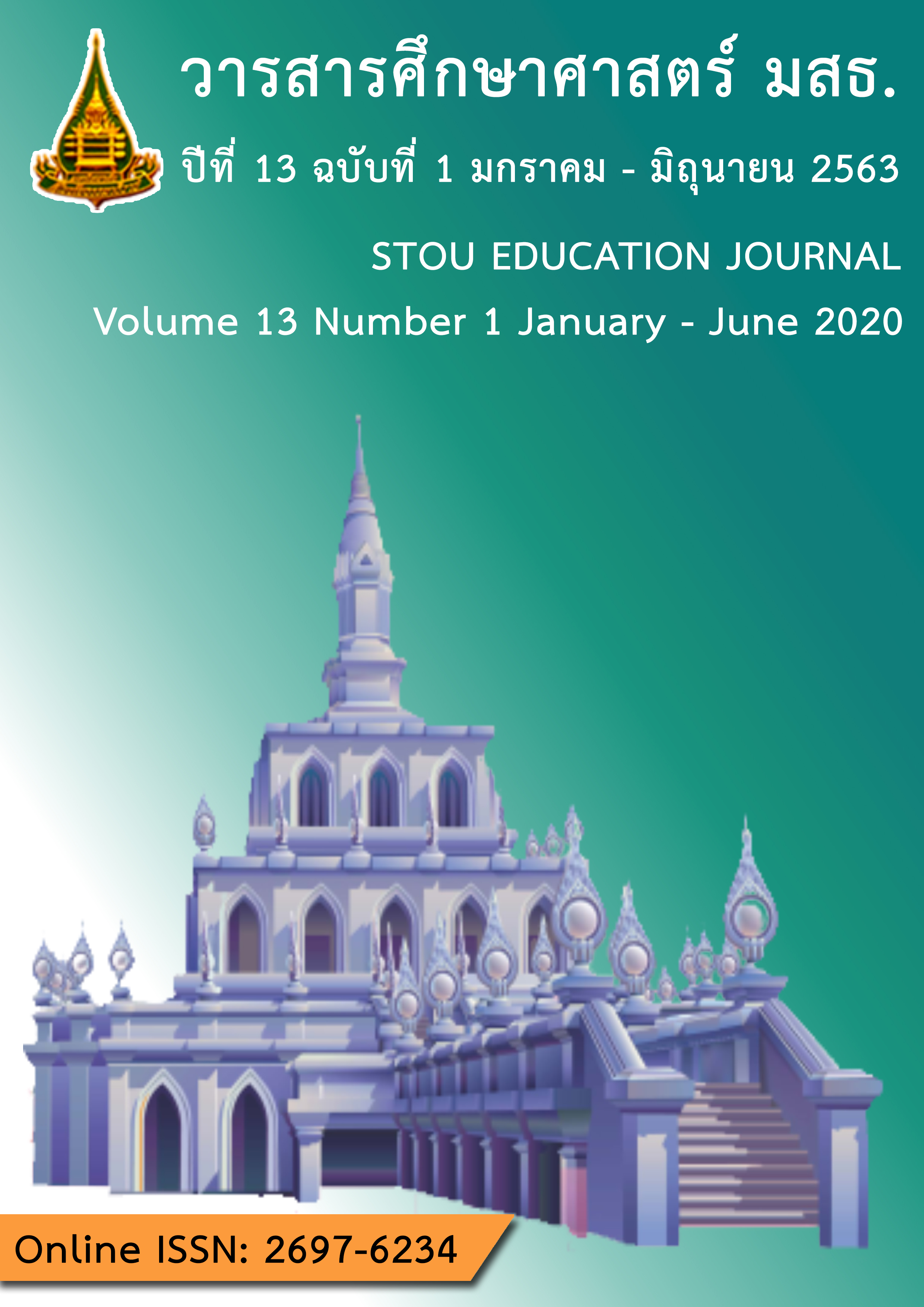The Management of Local Wisdom Learning Resources of the Old Chao Phraya Riverside Communities for Sustainable Education
Main Article Content
Abstract
The objectives of this research were to study 1) local wisdom learning resources facilitating learning in the communities along the Old Chao Phraya River, 2) potential and participation of the communities in using local wisdom learning resources for educational management, and 3) guidelines for administering local wisdom learning resources for sustainable education. The informants comprised 16 local wisdom experts, 40 community leaders, school administrators, supervisors, teachers, and related people. The sample consisted of 400 community members and related people in Bangkok Yai and Bangkok Noi districts. The employed research tools included an interview, a questionnaire, and guidelines for a focus group discussion. The data were analyzed using the mean, standard deviation, and content analysis. The research results revealed that: 1) most local wisdom products were in the field of crafts, 2) the overall potential of the communities in using learning resources was rated at a moderate level, and the aspect receiving the highest average score was that the communities had a plan for managing local learning resources. The overall participation of the communities in using learning resources was rated at a moderate level, and the aspect receiving the highest average score was that the participation in analyzing current conditions and problems in using local wisdom resources for educational purposes, and 3) guidelines for utilizing the learning resources, including creating a local wisdom database, websites, documents and publications, videos, CAI lessons, school-based curriculum, and additional learning contents.
Article Details
References
จรัญญา บันเทิง. (2548). การมีส่วนร่วมในการพัฒนาชนบท. กรุงเทพมหานคร: โอ เอ พริ้นติ้งการพิมพ์.
นงเยาว์ อุทุมพร. (2558). รายงานการวิจัยการพัฒนาการบริหารจัดการแหล่งเรียนรู้ภูมิปัญญาท้องถิ่นตามหลักเศรษฐกิจพอเพียงในชุมชนเขตธนบุรี. กรุงเทพมหานคร: มหาวิทยาลัยราชภัฏธนบุรี.
นภดล ฮมแสน. (2546). การวิเคราะห์ศักยภาพชุมชนท้องถิ่นกับการจัดการอุทยานแห่งชาติกรณีศึกษาอุทยานแห่งชาติเฉลิมรัตนโกสินทร์จังหวัดกาญจนบุรี. (วิทยานิพนธ์ศิลปศาสตรมหาบัณฑิต ไม่ได้ตีพิมพ์). มหาวิทยาลัยเกษตรศาสตร์, กรุงเทพมหานคร.
พระราชบัญญัติการศึกษาแห่งชาติ พุทธศักราช 2542 แก้ไขเพิ่มเติม (ฉบับที่ 2) พ.ศ. 2545. (2545, 19 ธันวาคม). ราชกิจจานุเบกษา. เล่ม 119 ตอนที่ 123 ก หน้า 16-21.
เรไร ไพรวรรณ์. (2548). รายงานการวิจัยการถ่ายทอดภูมิปัญญาชาวบ้าน: กรณีศึกษาชุมชนในเขตธนบุรี. กรุงเทพมหานคร: มหาวิทยาลัยราชภัฏธนบุรี.
วารี หอมอุดม. (2553). คุณค่าของภูมิปัญญา และวัฒนธรรมไทย และการสืบทอด. สืบค้นจาก http://www.kroobannok.com
เสรี พงศ์พิศ. (2547). ชาวบ้านชวนคิดภาพนิมิตการพัฒนา. กรุงเทพมหานคร: พลังปัญญา.
สุมน อมรวิวัฒน์. (2544). กระบวนการเรียนรู้จากแหล่งเรียนรู้ในชุมชนและธรรมชาติ. กรุงเทพมหานคร: สำนักงานคณะกรรมการการศึกษาแห่งชาติ.
สำนักงานคณะกรรมการการศึกษาแห่งชาติ. (2541). แนวทางการส่งเสริมภูมิปัญญาไทยในการจัดการศึกษา.กรุงเทพมหานคร: สำนักงานคณะกรรมการการศึกษาแห่งชาติ.
อดิสรณ์ เรืองจุ้ย. (2550). การศึกษาการใช้ภูมิปัญญาท้องถิ่นของครูในการเรียนการสอนกลุ่มสาระการเรียนรู้ภาษาไทยระดับมัธยมศึกษาตอนต้น ในสถานศึกษาสังกัดสำนักงานคณะกรรมการการศึกษาขั้นพื้นฐานในเขตภาคกลาง. (วิทยานิพนธ์ครุศาสตรมหาบัณฑิต ไม่ได้ตีพิมพ์). จุฬาลงกรณ์มหาวิทยาลัย, กรุงเทพมหานคร.
Yamane, T. (1973). Statistics: An introductory analysis (3rd ed). New York: Harper & Row.


